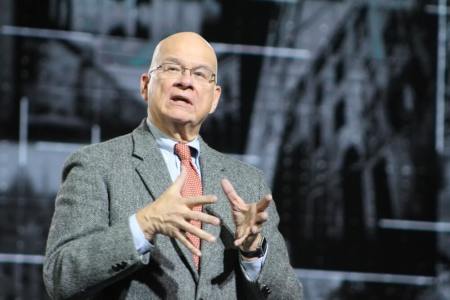Christian Positions Are Not Republican or Democrat, Tim Keller Says

Timothy Keller has argued that historical Christian positions on controversial social issues do not fit with America's two-party political system.
Keller, a best-selling author and founder of Redeemer Presbyterian Church in New York City, wrote in an op-ed for The New York Times on Saturday that the Christian approach to social issues could be attacked both by the left and the right.
"For example, following both the Bible and the early church, Christians should be committed to racial justice and the poor, but also to the understanding that sex is only for marriage and for nurturing family," he wrote.
"One of those views seems liberal and the other looks oppressively conservative. The historical Christian positions on social issues do not fit into contemporary political alignments."
Keller pointed out that this does not mean that Christians should avoid making stands on important issues, noting that in the 19th century, churches that did not speak out against slavery were in reality supporting the practice.
"The Bible shows believers as holding important posts in pagan governments — think of Joseph and Daniel in the Old Testament. Christians should be involved politically as a way of loving our neighbors, whether they believe as we do or not," he positioned.
"To work for better public schools or for a justice system not weighted against the poor or to end racial segregation requires political engagement. Christians have done these things in the past and should continue to do so."
He argued that while believers can be active in politics, they "should not identify the Christian church or faith with a political party as the only Christian one."
The preacher warned that doing so could legitimize the arguments of skeptics that say that religion is just another voting bloc looking for power.
"Another reason not to align the Christian faith with one party is that most political positions are not matters of biblical command but of practical wisdom. This does not mean that the church can never speak on social, economic and political realities, because the Bible often does," he wrote.
"Racism is a sin, violating the second of the two great commandments of Jesus, to 'love your neighbor.' The biblical commands to lift up the poor and to defend the rights of the oppressed are moral imperatives for believers. For individual Christians to speak out against egregious violations of these moral requirements is not optional."
Keller argued that it is neither valid to withdraw entirely from politics, nor to "assimilate and fully adopt one party's whole package."
"The Gospel gives us the resources to love people who reject both our beliefs and us personally. Christians should think of how God rescued them. He did it not by taking power but by coming to earth, losing glory and power, serving and dying on a cross. How did Jesus save? Not with a sword but with nails in his hands," he concluded.
Mark Tooley, president of the Institute on Religion and Democracy, praised Keller's op-ed in a blog post, but added that some Christians rightly serve God in a life of political abstinence while others serve God in politically partisan endeavors.
"Cloistered religious orders, the Amish, various other separatist communities, and many persons are generous in prayer and charity without direct political witness. They serve God where they are without insisting all others follow their example," he wrote. And, "Intense or professional political activism is a special calling likely for very few Christians, as no doubt Keller would agree."
Keller has made similar points in the past, and in 2016 told Christians divided by politics that their Christian identity should come first.
"All across the world there is a lot of political fragmentation ... there is more and more political fragmentation in so many countries, and unfortunately Christians might be tempted to be fragmented right along. We might start getting divided politically instead of remembering that you're Christian first and you're white, black, Asian, Hispanic, second. You're a Christian first and you're American, or you're British and you're African second," the theologian argued weeks before the 2016 general election in the U.S., won by now-President Donald Trump.





















